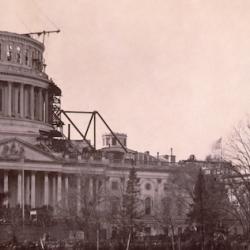Religious freedom is basic to American freedoms, conservatives say. Bringing religion into the public square violates the separation of church and state, liberals say. Both are wrong, says David Sehat in his The Myth of American Religious Freedom. Conservatives are wrong to think that American religion has always been in service of freedom (at least, not freedom as we now conceive it). Liberals are wrong to think that religion has no place in American public life.
The myth of American religious freedom is actually a threefold myth, Sehat argues. The first is the myth of separation. Though separation of church and state was “important to some of the Founding Fathers,” yet “the U.S. Constitution and First Amendment did not create the separation that Madison and Jefferson advocated. Principles of federalism gave the states an enormous reservoir of power to regulate the health, welfare, and morals of its residents, and religious partisans drew from this source to imprint their moral ideals onto state constitutions and judicial opinions. Prosecution for blasphemy [still taking place in the late 19th century] was just one of many religious and moral regulations that formed a moral establishment that connected church and state” (4-5).
The second myth of the myth of decline, the notion that the US has grown “into a modern nation” with the result that “the religious sensibilities that were so prevalent in the early centuries waned.” Sehat argues that, on the contrary, “religious has, over the last two hundred years, become more important to the public life of the United States rather than less” (5-6).
Finally, there is the myth of “exceptional liberty,” which suggests that “religious liberty in the United States forms the cornerstone of American liberty more generally and makes the United States into a beacon of freedom to the world.” Throughout the first century and a half of our history, though, “proponents of the moral establishment claimed that God’s will should determine the parameters of American freedom.” Foreign observers recognized these constraints. John Stuart Mill opined that “in no country does there exist less independence of thought.” While “the rejection of authority, and the assertion of the right of private judgment” were basic to the American system, still he recognized that this freedom of private judgment was constrained by “the fundamental doctrines of Christianity and Christian ethics.” Tocqueville likewise saw the US as a “moral empire.”
There is much to commend this analysis, but a couple of qualifying criticisms. First, the notion that religious freedom is a “myth” depends on a contemporary understanding of religious freedom. Sehat’s argument might be reduced to the thesis that “19th-century Americans understood liberty differently than do 21st-century Americans.” An important point, but it softens the rhetoric of “myth.” Second, and more deeply, Sehat’s analysis doesn’t make enough of the peculiar arrangement of Christianity in America, formed not by disestablishment but by a foundational pluralism. That didn’t ensure religious freedom in an absolute sense, but it did make American Christianity unusual if not unique.















